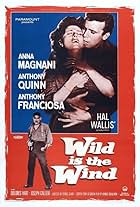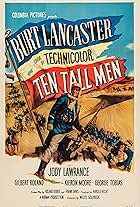IMDb RATING
6.9/10
4.7K
YOUR RATING
A Sicilian seamstress who idolizes her husband must deal with several family crises upon his sudden death.A Sicilian seamstress who idolizes her husband must deal with several family crises upon his sudden death.A Sicilian seamstress who idolizes her husband must deal with several family crises upon his sudden death.
- Won 3 Oscars
- 10 wins & 7 nominations total
Albert Adkins
- Mario
- (uncredited)
Don Bachardy
- Passenger in Back Seat of Car
- (uncredited)
Larry Chance
- Rosario Delle Rose
- (uncredited)
Lewis Charles
- Taxi Driver
- (uncredited)
Roger Gunderson
- Doctor
- (uncredited)
George Humbert
- Pop Mangiacavallo
- (uncredited)
Dorrit Kelton
- Schoolteacher
- (uncredited)
May Lee
- Mamma Shigura - Tattoo Artist
- (uncredited)
Storyline
Did you know
- TriviaAlthough the script places the location in a small Mississippi Gulf town, exteriors were shot in Key West. While scouting for locations, a perfect fit was found on Duncan Street for the exterior of the house owned by Serafina Delle Rose. Filmmakers needed to build a fence for a goat paddock, and the crew was worried the owner of the house next-door might object to the filming nearby and a ramshackle fence on his property. They needn't have worried - the house and property next-door at 1431 Duncan was the home that Tennessee Williams shared with his lover Frank Merlo, who happily agreed to its use, even inviting Magnani (close friends of Merlo and Williams) and Lancaster to use it as their dressing rooms. In later years, Williams had an enormous mosaic of a rose tattoo embedded in the floor of the pool behind the house, which is still there.
- GoofsWhen the truck crashes in flames and rolls down the hillside, it is obvious from the beginning of the sequence that there is nobody in the cab.
- Quotes
Schoolteacher: Mrs. Delle Rose. I don't understand how a woman that acts like you could have such a sweet and refined young girl for a daughter.
- ConnectionsEdited into Lo schermo a tre punte (1995)
- SoundtracksThe Sheik of Araby
by Ted Snyder, Francis Wheeler and Harry B. Smith
Used instrumentally (player piano)
Featured review
Time has not been kind to The Rose Tattoo, a 1955 release that garnered three Oscars, plus additional nominations. Originally written by Tennessee Williams as a play, the film's shortcomings now cancel out much that audiences might have found entertaining about it 47 years ago. The deficits include bad acting all around (with the exception of the star, Anna Magnani) and an uneven script by Williams (who among other things was apparently clueless about how an adolescent boy and girl, attracted to each other, might talk or behave).
Playing the role of the dim-witted but sexy truck driver who courts a grieving widow (Magnani), Burt Lancaster gives a highly exaggerated "comedy performance" that is occasionally embarrassing to watch. A great natural actor in his other films and noted for his controlled physicallity, Lancaster here gawks, bends, waves his arms, makes faces, cries (clownishly), and is generally ape-like, all the while failing to get inside the character he's portraying. (Leading American actors have always had a problem convincingly playing people less intelligent than themselves; see Lon Chaney, Jr. in Of Mice and Men or, more recently, Jack Nicholson in Prizzi's Honor for more examples of this.)
Under the direction of Daniel Mann (who also directed the play), and intended as a comedy-drama, almost everything in Rose Tattoo is either loud or overblown (though it may have been Williams' wish that it be played this way in a misguided attempt to heighten the humorous dimension of the story). The host of supporting characters are all portrayed as one-dimensional grotesques or harpies who telegraph their every thought or emotion by arm-waving, facial contortions, or semiphoring the kind of villainousness that went out in the early '30s. Nor does Mann seem to have fine control over the physical goings-on by cast members. In some scenes small groups of people rush back and forth like obedient cattle, too obviously responding to off-camera direction; and at the high school prom a male extra noticeably freezes for a second or two as he waits for Marisa Pavan and her sailor dance partner to leave the floor ahead of him.
Magnani, for whom the play was written (though she just appeared in the film, after she had mastered the rudiments of the English language), comes across as the only real human being among a slew of posturing marionettes. Her portrayal of a terribly put-upon Sicilian widow fighting off the knowledge of her dead husband's infidelity and desperately trying to maintain her dignity in the face of snide remarks and out-and-out insults is awe-inspiring. I doubt that her performance has ever been matched by any American actress before or after. (Only Vivien Leigh, a Brit, comes to mind as a mentally disintegrating Blanche du Bois in the film version of Williams' A Streetcar Named Desire.) Williams, who was famously homosexual, understood and probably identified with vulnerable women. (Years before, his own sister, when a young woman, had been seriously mentally ill, "put away," and had undergone a lobotomy. It was no coincidence that her name was Rose.)
Playing the role of the dim-witted but sexy truck driver who courts a grieving widow (Magnani), Burt Lancaster gives a highly exaggerated "comedy performance" that is occasionally embarrassing to watch. A great natural actor in his other films and noted for his controlled physicallity, Lancaster here gawks, bends, waves his arms, makes faces, cries (clownishly), and is generally ape-like, all the while failing to get inside the character he's portraying. (Leading American actors have always had a problem convincingly playing people less intelligent than themselves; see Lon Chaney, Jr. in Of Mice and Men or, more recently, Jack Nicholson in Prizzi's Honor for more examples of this.)
Under the direction of Daniel Mann (who also directed the play), and intended as a comedy-drama, almost everything in Rose Tattoo is either loud or overblown (though it may have been Williams' wish that it be played this way in a misguided attempt to heighten the humorous dimension of the story). The host of supporting characters are all portrayed as one-dimensional grotesques or harpies who telegraph their every thought or emotion by arm-waving, facial contortions, or semiphoring the kind of villainousness that went out in the early '30s. Nor does Mann seem to have fine control over the physical goings-on by cast members. In some scenes small groups of people rush back and forth like obedient cattle, too obviously responding to off-camera direction; and at the high school prom a male extra noticeably freezes for a second or two as he waits for Marisa Pavan and her sailor dance partner to leave the floor ahead of him.
Magnani, for whom the play was written (though she just appeared in the film, after she had mastered the rudiments of the English language), comes across as the only real human being among a slew of posturing marionettes. Her portrayal of a terribly put-upon Sicilian widow fighting off the knowledge of her dead husband's infidelity and desperately trying to maintain her dignity in the face of snide remarks and out-and-out insults is awe-inspiring. I doubt that her performance has ever been matched by any American actress before or after. (Only Vivien Leigh, a Brit, comes to mind as a mentally disintegrating Blanche du Bois in the film version of Williams' A Streetcar Named Desire.) Williams, who was famously homosexual, understood and probably identified with vulnerable women. (Years before, his own sister, when a young woman, had been seriously mentally ill, "put away," and had undergone a lobotomy. It was no coincidence that her name was Rose.)
- burgbob975
- Mar 16, 2002
- Permalink
- How long is The Rose Tattoo?Powered by Alexa
Details
Box office
- Gross US & Canada
- $4,200,000
- Runtime1 hour 57 minutes
- Color
- Aspect ratio
- 1.85 : 1
Contribute to this page
Suggest an edit or add missing content































